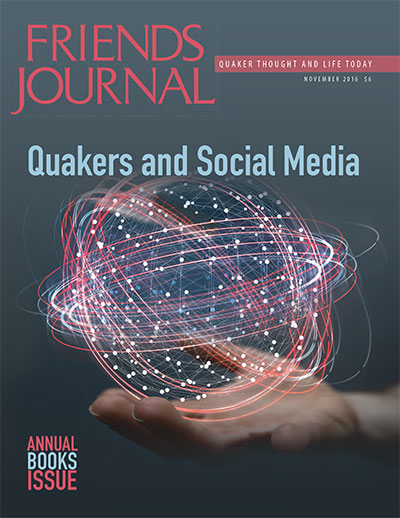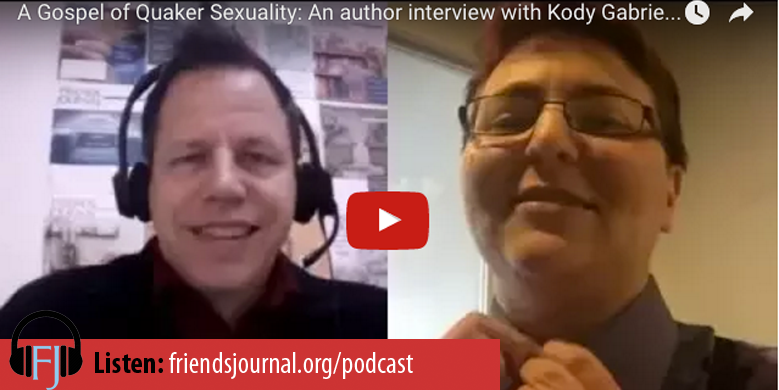Love is a beautiful thing
I was searching today for something to help me articulate my own beliefs on this subject, and happened upon this wonderful piece (“A Gospel of Quaker Sexuality” by Kody Gabriel Hersh, FJ May). I do not think I could have spoken more eloquently on the subject than Hersh has. If God is the loving, compassionate, and kind being we believe Him to be, then why would He disapprove of the love between two individuals simply because they share the same anatomy, don’t happen to be married, etc.? Love is a beautiful thing, and I truly believe that so long as the love we have for each other helps us to live better on the path of kindness, peace, and compassion, God would have no problem with us.
Joshua Feierman
Philadelphia, Pa.
I especially want readers to note that Kody Hersh used the word “choice.” This is dramatically different from the word usually employed, specifically “consent.” To “consent” is to allow to occur what has been asked, In medical practice the doctor is required to obtain “an informed consent” from the patient. The doctor advises and the patient consents.
Choice requires two things: (1) the person be able to choose, and (2) they actually choose. When people choose, on whatever grounds—desire, fear, logic, hope—they are deciding what they conclude is right for them at that moment. What happens next, then, is at least partially determined by them, presumably to the extent that consequences can be influenced by their choice. As such, they must and they can legitimately hold themselves accountable for what happens next.
In considerations about sexual relationships, there is a vast difference between choosing, initiating, and consenting to someone more powerful. “Consenting” is the term presently used to describe a sexual action that is “okay.” But the person consenting never initiates the action. Consider the difference in choosing what you want to have for dinner at a restaurant in contrast to consenting to have what the host suggests. This is key to understanding the serious problems associated with the use of this word “consent,” both in medical practice and with regards to sexual relationships.
George L. Spaeth
Philadelphia, Pa.
Friends not like us
It brings sorrow to me to think an unprogrammed Friend (as I am) could be so judgemental of another Friend’s practice (“What Unites Us” by Gretchen Castle, FJ Oct.). But then, it took me much exposure and visitation to understand that there were Friends who were not like me. When I arrived here at Hopewell Centre Meeting in Winchester, Va., part of Baltimore Yearly Meeting, I had already been a Quaker from Philadelphia Yearly Meeting for over ten years, but I had never heard of Friends United Meeting (FUM). I had heard much less about Friends in Africa or South America than about those in the United States or Britain. I grew to be both excited and curious to interact with Friends of other traditions. Most times, if I could resist setting any agenda and greet the guest with love and hospitality, this was a wonderful experience. I came to see that it was only when I let fear or expectation interfere with the process that things went awry.
My own monthly meeting belongs to both Friends General Conference and FUM. Beliefs in our meeting are diverse. By maintaining the same spirit of love and hospitality, along with the belief that there is that of God in each of us, we are able to support and grow in diversity and depth of faith.
Linda Wilk
Falling Waters, W. Va.
Tourism and social justice
What I think would resonate with visitors both domestic and foreign would be an emphasis on social justice and liberation as a faith practice (“Ministry of Tourism” by Lynne Calamia, FJ June/July). Equality of genders, equality of ethnicities, equality of prisoners, the equality in dealing with Indigenous peoples, along with the dignity of children, animals, and nature: all sacred creation. We made mistakes and we are trying to learn from them. All visitors can identify with at least one of these aspects, and all can rejoice that the traditional values and concerns remain embedded in what it means to be a Friend.
Kathy Hersh
Miami, Fla.
Influence of past Vikings
I greatly enjoyed George Lakey’s article “Equality among Today’s Vikings” (FJ,Sept.). While he described the current emphasis on equality in the Nordic (Viking) countries, it is also interesting that there is a strong link between early Friends and Viking culture.
In Albion’s Seed: Four British Folkways in America, author David Hackett Fischer notes that the northern Midlands in England, the birthplace of Quakerism, was more densely settled by Norse invaders than any other part of England. One of the Scandinavian folkways that the Norse brought with them was that woman had high social status and enjoyed full legal protection. It is somewhat ironic that the Quaker religious belief “in soul there is no sex” was likely influenced by a regional culture that awarded women rights and status because of the necessity that arose from the long absences of men away on voyages of plunder.
David Rose
Easton, Pa.
Fossil fuel divestment
I was happy to see Marjorie Isaacs’s article about the success—and the struggle—of her meeting deciding to divest from fossil fuels (“Climate Change Can’t Wait for Quaker Time,” FJ Sept.). It is true that divestment speaks to corporations in a language they understand, which is money. It is also crucial to point out that the divestment movement has an additional goal: to remove, by public opinion, the social license that oil companies have enjoyed up to now. This social license gives them the freedom to continue to cause global warming while making a profit. This social license is being revoked by the divestment movement and by resistance to fossil fuel exploration and extraction worldwide. It’s important, for skeptics especially, to understand this: meetings who divest do not believe their exit is sufficient to alarm, scare, or disable the oil companies. Please check the website 350.org if you are open to more persuasion, or ask the descendants of John D. Rockefeller, whose foundation they recently decided to divest from fossil fuels, the very source of their wealth.
Karie Firoozmand
Timonium, Md.
To vote or not to vote
It’s tempting for Friends to try to be “pure” in our actions (“Why Quakers Stopped Voting” by Paul Buckley, FJ Oct.), accordingly with how our consciences are illuminated by the Inward Light. I have in the past been moved by this call to purity myself. The urge to “not vote” as an exercise of conscience and faith is an example of this.
In this election, assuming it isn’t overtaken by events, either Clinton or Trump will be declared the victor. The candidates are strikingly different in their stated propensity to militarily confront Russia, and of course Clinton has actual experience in regard to advocating war that we must consider. In fact, the Obama administration, Nobel Peace Prize notwithstanding, is dangerously confronting Russia right now.
So one might ask him or herself which is more important: to maintain the purity of my conscience, or to do whatever I can to prevent the election of someone who seems quite willing to risk a war with Russia. For the sake of my children, and all children, I would be willing to tarnish my conscience, and my choice is clear. I have positive reasons to support Trump, but this negative one alone would decide it for me. I don’t want a president who is reckless enough to militarily confront Russia for the sake of Aleppo and for armed insurgents trying to topple the government of Syria. The stakes are just too high.
Not voting, in itself, absolves one of nothing, in my opinion. I don’t think we should flagellate ourselves for past actions; we all do the best we can with the knowledge and illumination we have at the time. But if we can act now, in whatever small way, to forestall great harm, we should do so.
Michael Lapreziosa
Lansdale, Pa.
More Ben!
The only thing wrong with the video interview with Ben Pink Dandelion is that it is so short (“How I Went from Being an Anarchist to a Quaker,” QuakerSpeak.com Oct.). I found it fascinating. I would like to have heard more of this journey. I am not a Quaker, though I have had a great interest in Friends for years. I am familiar with Ben Pink Dandelion through his various writings.
Russell McLernon
Cookstown, Tenn.
Please, please, if you’re lurking out there, Ben, share with us the spiritual experience on that Greyhound bus ride. I’ve had more than one long conversation with God during a cross-country journey. Something about the freedom from interruptions, and maybe the vehicle is such a good sound chamber that it makes it easier to hear that still, small voice.
Mariellen Gilpin
Champaign, Ill.
Ben is unclear. What does “We were being ‘talked through’ in Quaker meeting” mean? Do you mean there was a spirit in business meeting not present in anarcho circles? I always felt that anarchism had a strong spirit of love and peace, expressed in unique ways. Quakers tend to be less angry, or certainly angry in different ways. It does produce its own imaginative processes that are certainly rooted in love, caring, and peace. Anarchism also has less formal processes and group hierarchy.
Paul Davies
Norwich, England





Comments on Friendsjournal.org may be used in the Forum of the print magazine and may be edited for length and clarity.